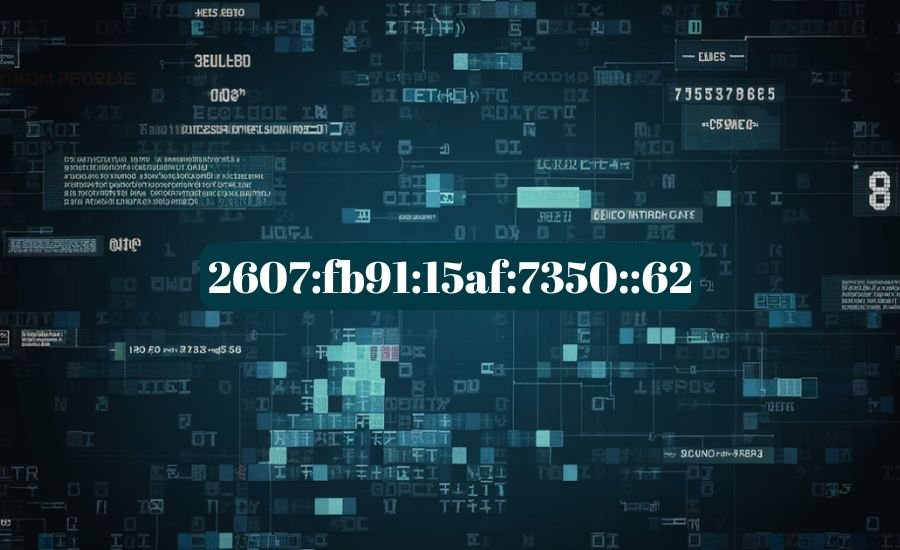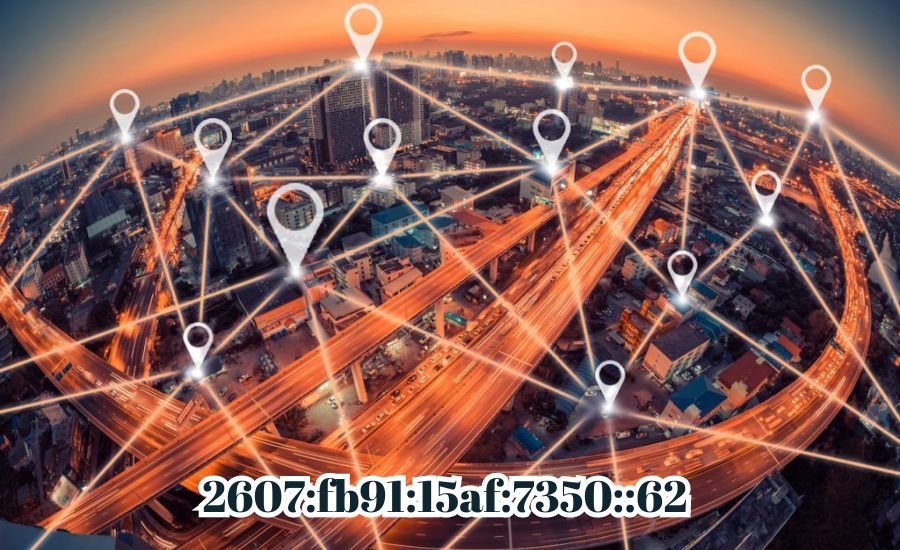The IPv6 address 2607:fb91:15af:7350::62 is a special part of the internet’s address system. Unlike the old IPv4 addresses, which are running out, IPv6 addresses like 2607:fb91:15af:7350::62 offer many more options. This address helps devices connect and talk to each other online.
Understanding IPv6 is important for everyone who uses the internet. This blog post will explain what the address 2607:fb91:15af:7350::62 means and why it is important. We’ll also look at how this address is used and what it tells us about the future of the internet.
What is IPv6 and Why Does 2607:fb91:15af:7350::62 Matter?
IPv6 is the latest version of the Internet Protocol, and it’s crucial for the functioning of modern internet networks. The IPv6 addresses is an example of an IPv6 address. IPv6 is designed to replace the older IPv4 due to the increasing number of internet-connected devices.
IPv4, with its limited number of addresses, is running out of space, causing potential issues for future growth. IPv6, on the other hand, provides a vastly larger address space, ensuring that every device, from smartphones to smart home gadgets, can have a unique address.
IPv6 addresses, including 2607:fb91:15af:7350::62, consist of 128 bits, compared to IPv4’s 32 bits. This change allows for a virtually unlimited number of addresses, accommodating the ever-expanding number of devices on the internet. Each IPv6 address is unique and can identify a specific device or network, making it easier to manage and connect devices globally.
Moreover, IPv6 brings several enhancements over IPv4. It includes improved security features, such as built-in encryption and better data integrity checks, which help protect user data from cyber threats. The IPv6 addresses exemplifies these advancements by being part of a network that benefits from these enhanced security measures.
How Does 2607:fb91:15af:7350::62 Fit into IPv6?
The address 2607:fb91:15af:7350::62 is a good example of how IPv6 addresses are structured and used. IPv6 addresses consist of eight groups of four hexadecimal digits separated by colons. In the case of IPv6 addresses, the double colons (::) represent a sequence of zeroes that have been omitted to simplify the address.
This notation makes it easier to read and manage the address. The structure of 2607:fb91:15af:7350::62 can be broken down into two main parts: the network prefix and the interface identifier. The network prefix, which is 2607:fb91:15af:7350, identifies the specific network to which the address belongs.
This part helps in routing the data to the correct network segment. The interface identifier, which is represented as ::62, uniquely identifies a device within that network. IPv6 addresses are designed to improve routing efficiency and network management.
By including a large address space and hierarchical structure, IPv6 enables better allocation and organization of network addresses. This structure helps in reducing the complexity of managing networks and enhances the efficiency of data transmission.
Breaking Down 2607:fb91:15af:7350::62

Understanding the IPv6 address involves examining its components and format. IPv6 addresses consist of eight sets of four hexadecimal digits arranged in eight groups of four. Each group is a 16-bit block, and the entire address is 128 bits long. This length provides a significant increase in the number of available addresses compared to IPv4.
In 2607:fb91:15af:7350::62, the address was divided into segments by colons. The double colons (::) indicate that there are consecutive blocks of zeroes omitted for brevity. This notation helps simplify the address and makes it easier to work with, especially when dealing with long sequences of zeros.
The IPv6 address is split into two main sections: the network prefix and the interface identifier. The network prefix 2607:fb91:15af:7350 identifies the larger network, while the interface identifier, represented as ::62, specifies the exact device or interface within that network. This division helps in efficiently routing data to the correct destination and managing network resources effectively.
Understanding 2607:fb91:15af:7350::62’s Structure
The IPv6 address has a distinctive structure that sets it apart from IPv4 addresses. It consists of eight groups of hexadecimal digits, which are separated by colons. Each group represents 16 bits from a 128-bit address. This large address space is a key feature of IPv6, allowing for a vast number of unique addresses.
The double colons (::) in the address are used to represent one or more contiguous blocks of zeroes. This notation helps to shorten the address and makes it easier to read. For example, the IPv6 addresses can be expanded to include all zero blocks, providing a complete view of the address structure.
IPv6’s structure improves upon the limitations of IPv4 by offering a more flexible and scalable addressing system. The use of hexadecimal notation and the ability to represent long sequences of zeroes make IPv6 addresses like 2607:fb91:15af:7350::62 both efficient and manageable. This design supports the growing number of devices connected to the internet and enhances overall network performance.
The Role of 2607:fb91:15af:7350::62 in Internet Connectivity
The IPv6 address 2607:fb91:15af:7350::62 plays a vital role in ensuring effective internet connectivity. Each IPv6 address is unique and serves as an identifier for devices and networks. The IPv6 addresses helps route data packets across the internet by providing a specific location for the data to be sent.
When data is transmitted over the internet, it is directed to the address specified in the IPv6 format. For the address 2607:fb91:15af:7350::62, this means that any data intended for this address will be routed through the network to reach its destination. The unique identifier ensures that data is delivered accurately and efficiently.
IPv6 also brings improvements to data transmission by supporting features like better quality of service and more efficient routing. Addresses like 2607:fb91:15af:7350::62 benefit from these advancements, resulting in faster and more reliable internet connections. As the number of devices on the internet grows, IPv6 addresses play an essential role in maintaining connectivity and performance.
How 2607:fb91:15af:7350::62 Support Modern Devices
IPv6 addresses, including 2607:fb91:15af:7350::62, are designed to support the wide range of modern devices that connect to the internet. With the growing number of smartphones, tablets, smart home devices, and other gadgets, IPv6 provides a sufficient number of unique addresses to accommodate all these devices.
The large address space of IPv6 addresses ensures that each device can have its own unique identifier. For instance, the IPv6 addresses allows for precise identification of a device within a network. This capability is crucial as more devices become connected and require distinct addresses to communicate effectively.
IPv6 also enhances the functionality of modern devices by supporting advanced features such as improved mobility and better security. Devices using IPv6 addresses like 2607:fb91:15af:7350::62 benefit from these features, which help in managing network connections and protecting data. This support ensures that devices can operate smoothly and securely in the expanding internet ecosystem.
Geolocation 2607:fb91:15af:7350::62

Geolocating an IPv6 address like 2607:fb91:15af:7350::62 involves using tools that map IP addresses to geographic locations. These tools provide an estimate of where the address is associated with, but the accuracy can vary.
Geolocation services work by referencing databases that link IP addresses to geographic information. For the address 2607:fb91:15af:7350::62, this could reveal which city or country the address is used in. However, keep in mind that geolocation data is not always precise and can change over time.
Understanding the general location of an IPv6 address helps in various applications, such as targeting content or managing network traffic. While the exact location may not be always accurate, it provides valuable insights into the address’s regional usage and network placement.
What Does the Prefix 2607:fb91:15af:7350 Mean?
In the IPv6 address 2607:fb91:15af:7350::62, the network prefix is the first part of the address. This prefix denotes which network an address belongs. For IPv6 addresses, the prefix 2607:fb91:15af:7350 helps route data to the appropriate network segment.
The network prefix is crucial for routing and managing internet traffic. It determines the larger network area where the address resides, helping network devices direct data packets correctly. This structure allows for efficient data transmission and network organization.
Network prefixes in IPv6 are allocated by internet service providers or network administrators. They play a key role in the hierarchical structure of IPv6, making it easier to manage and scale networks. For the IPv6 addresses, this prefix ensures proper routing and connectivity within the network.
The Importance of 2607:fb91:15af:7350::62 for Security
The IPv6 address 2607:fb91:15af:7350::62 is important for security in modern networks. IPv6 includes several built-in security features that enhance the protection of data transmitted over the internet. These features help safeguard against various cyber threats and ensure data integrity.
IPsec is one of the primary security features in IPv6, providing encryption and authentication of data packets. This means that data sent to or from the IPv6 addresses is protected from interception and tampering. IPsec helps ensure that communication remains private and secure.
Additionally, IPv6 addresses are less susceptible to certain types of attacks compared to IPv4. The larger address space and improved protocols contribute to a more secure network environment. By using addresses like 2607:fb91:15af:7350::62, networks can benefit from these enhanced security features and reduce the risk of vulnerabilities.
Managing IPv6 Address 2607:fb91:15af:7350::62 in Your Network
Managing an IPv6 address like 2607:fb91:15af:7350::62 involves ensuring that it is properly configured and maintained within your network. This includes assigning the address to the correct device, monitoring its usage, and making sure it adheres to network policies.
Proper management of IPv6 addresses helps in maintaining network performance and security. For instance, configuring the IPv6 addresses correctly ensures that it can communicate effectively with other devices and services. Regular monitoring helps in identifying any issues or conflicts that may arise.
Network administrators use various tools and techniques to manage IPv6 addresses. This includes address planning, tracking, and implementing best practices for network configuration. Effective management of addresses like 2607:fb91:15af:7350::62 ensures that the network runs smoothly and securely.
Troubleshooting Issues with IPv6 Address 2607:fb91:15af:7350::62

Troubleshooting issues with an IPv6 address like 2607:fb91:15af:7350::62 involves identifying and resolving problems that affect network connectivity. Common issues include incorrect address configuration, connectivity problems, and conflicts with other addresses.
To troubleshoot, start by checking the address configuration to ensure it matches network requirements. Verifying that the IPv6 addresses is correctly assigned and does not conflict with other addresses is crucial. Network tools can help diagnose and resolve connectivity issues.
If problems persist, consult network logs and diagnostic tools to identify the root cause. Addressing any configuration errors or network issues will help restore proper functionality. By systematically troubleshooting, you can ensure that the IPv6 address 2607:fb91:15af:7350::62 works effectively within your network.
Enhancing Performance with IPv6 Address 2607:fb91:15af:7350::62
Enhancing the performance of a network that uses an IPv6 address like 2607:fb91:15af:7350::62 involves optimizing various aspects of network management. This includes improving routing efficiency, reducing latency, and ensuring reliable connectivity.
One way to enhance performance is by implementing efficient routing protocols. IPv6 supports advanced routing techniques that help in directing data packets more effectively. For the IPv6 addresses, this means faster and more reliable data transmission.
Additionally, optimizing network configurations and hardware can contribute to better performance. Ensuring that devices and infrastructure are compatible with IPv6 standards helps in achieving optimal results. By focusing on these aspects, you can improve the overall performance and efficiency of your network.
IPv6 Address 2607:fb91:15af:7350::62 in Cloud Computing
The IPv6 address 2607:fb91:15af:7350::62 plays a significant role in cloud computing environments. Cloud services often rely on IPv6 to provide scalable and efficient connectivity for virtual resources and applications.
In cloud computing, IPv6 addresses help in managing and connecting virtual machines, storage, and other resources. The IPv6 addresses ensures that these resources have unique identifiers, facilitating smooth communication and operation within the cloud.
Additionally, IPv6 supports advanced features that benefit cloud computing, such as improved quality of service and enhanced security. By using addresses like 2607:fb91:15af:7350::62, cloud providers can offer better performance and security for their services, meeting the needs of modern cloud-based applications.
Privacy Concerns with 2607:fb91:15af:7350::62
Privacy is an important consideration when using IPv6 addresses, including 2607:fb91:15af:7350::62. Since IPv6 addresses are globally unique, they can potentially be used to track online activity and identify users.
To address privacy concerns, it’s essential to use tools and practices that enhance anonymity. This may include using virtual private networks (VPNs) or privacy-focused browser extensions to mask the address and protect user information.
Additionally, implementing address management strategies that prevent unauthorized tracking is crucial. By ensuring that personal data and browsing habits are not exposed, users can maintain their privacy while using IPv6 addresses like 2607:fb91:15af:7350::62.
Do You Know: AbsoGraphics.com Blog
Future Trends for 2607:fb91:15af:7350::62

The future of IPv6 addresses, including 2607:fb91:15af:7350::62, is expected to involve significant advancements and changes. As the number of internet-connected devices continues to grow, IPv6 will play a key role in addressing the increasing demand for unique identifiers.
Future trends may include improvements in how IPv6 addresses are managed and utilized. Innovations in network technology and address allocation will enhance the efficiency and security of IPv6.
Staying updated with these trends is important for ensuring that IPv6 addresses like 2607:fb91:15af:7350::62 remain effective and relevant. Monitoring developments in the field will help in adapting to new technologies and maintaining optimal network performance.
How IPv6 Address 2607:fb91:15af:7350::62 Fits Globally
The IPv6 address is an integral part of the global internet infrastructure. It helps in connecting devices and networks across the world by providing a unique identifier for each device.
In the global internet system, IPv6 addresses like 2607:fb91:15af:7350::62 facilitate communication between devices and networks. The unique address ensures that data is routed correctly and efficiently across different regions.
Understanding the role of addresses like 2607:fb91:15af:7350::62 in the global network helps in appreciating the complexity and scale of the internet. It highlights how IPv6 supports worldwide connectivity and contributes to the seamless operation of internet services.
Impact of 2607:fb91:15af:7350::62 on Network
The IPv6 address has a notable impact on network infrastructure. By providing a large address space and improved features, it contributes to the efficient routing and management of network resources.
IPv6 addresses like 2607:fb91:15af:7350::62 enable better scalability and flexibility in network design. This is essential for accommodating the growing number of devices and internet services, ensuring that networks can handle increasing demands.
The adoption of IPv6 addresses enhances overall network performance and reliability. By integrating addresses like 2607:fb91:15af:7350::62 into network infrastructure, organizations can improve their ability to manage traffic and provide high-quality internet services.
Conclusion
IPv6 addresses like 2607:fb91:15af:7350::62 are really important for the future of the internet. They help make sure that every device, from your phone to your smart home gadgets, has a unique and safe place to connect online. With more and more devices needing addresses, IPv6 makes sure we don’t run out of space, so everything works smoothly.
Using IPv6 also brings better security and performance, which is great for keeping your data safe and making the internet faster. So, next time you see an address like 2607:fb91:15af:7350::62, remember it’s a big part of making the internet better for everyone!
Read Next: Standart Product FLD
FAQs About 2607:fb91:15af:7350::62
Q: What is IPv6?
A: IPv6 stands for Internet Protocol version 6. It’s the latest version of the Internet Protocol, designed to replace IPv4 and provide more unique IP addresses for devices.
Q: Why do we need IPv6?
A: We need IPv6 because IPv4 addresses are running out. IPv6 offers a much larger pool of addresses, ensuring that every device can have its own unique address.
Q: What does the address 2607:fb91:15af:7350::62 represent?
A: The address 2607:fb91:15af:7350::62 is an IPv6 address that helps identify a specific device or network location on the internet.
Q: How is an IPv6 address structured?
A: An IPv6 address is made up of eight groups of four hexadecimal digits, separated by colons. It uses a 128-bit address scheme.
Q: What are the benefits of using IPv6?
A: IPv6 provides a larger address space, improved security features, and better support for modern devices and applications.
Q: How can I check if my device supports IPv6?
A: You can check your device’s network settings or use online tools to see if it is using an IPv6 address.
Q: Will IPv6 replace IPv4 completely?
A: IPv6 is gradually replacing IPv4, but both will coexist for some time as the transition continues.
